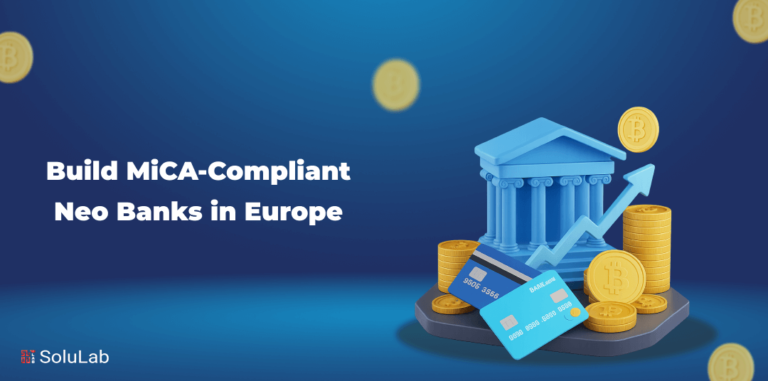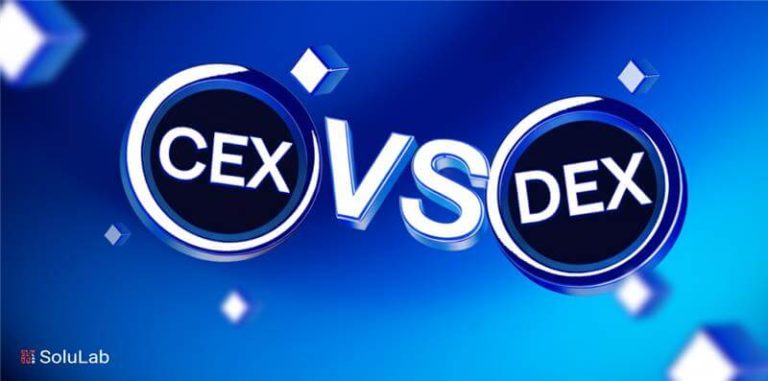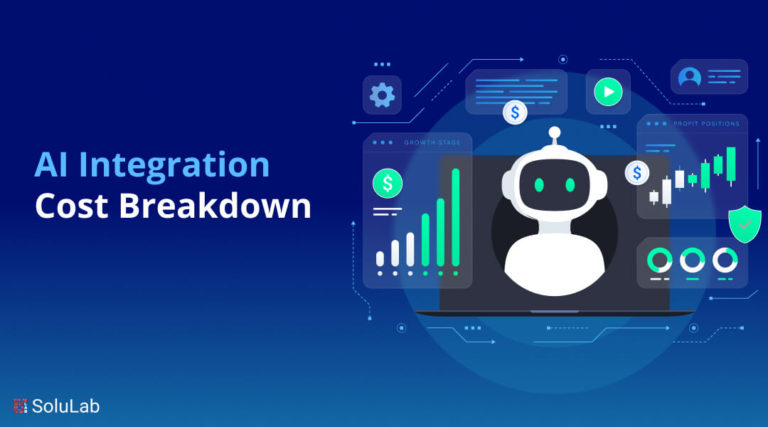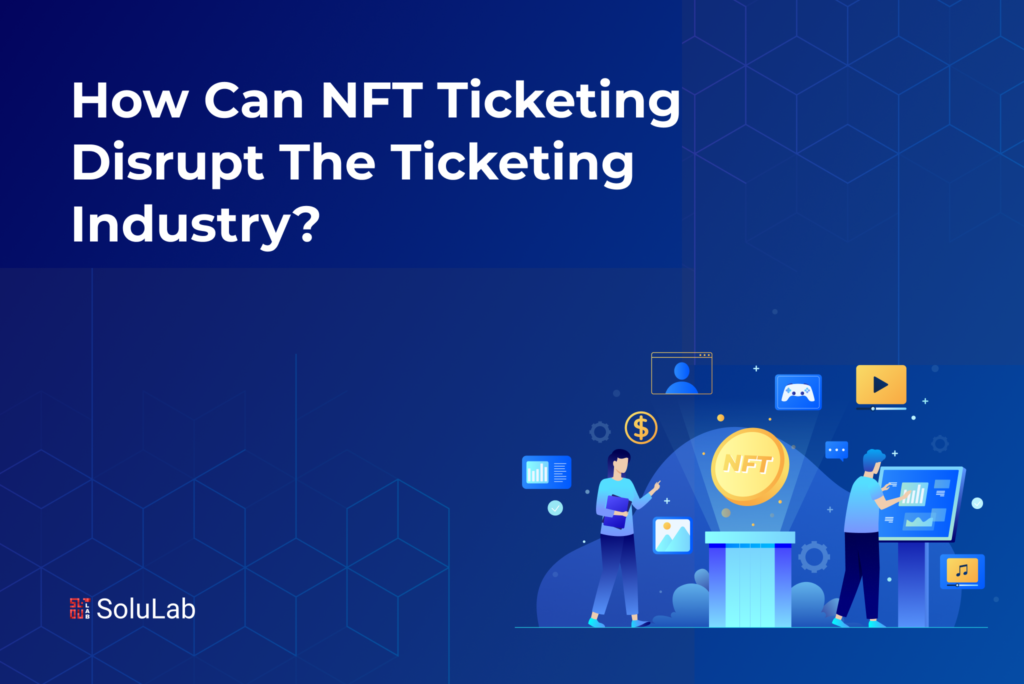
Non-fungible tokens, or NFTs, are very popular; trade volumes on the NFT market have reached an astounding $24.9 billion. Cryptographic tokens known as NFTs are used to replace certain digital assets. Tokenizing digital and physical assets, such as real estate, jewelry, or artwork, is made possible by NFTs.
The event industry has been a leader in connecting physical and digital tickets with NFTs, despite the fact that NFTs are changing many other businesses. People collected paper tickets prior to the advent of digital ticketing. With the efficiency that digitization has brought to ticketing, anybody may now use the NFT ticket system with confidence.
On the other hand, using a simple QR code that has no context seems pointless. Digital tickets are not regarded as heirlooms and cannot be retained. A paper ticket might get lost, ruined by water, or ruined. Moreover, tickets printed on paper offer little security because they are easily counterfeited. While QR codes help organizers with this problem, consumers cannot benefit from them.
NFT ticketing eliminates the need for compromise, and technology benefits both event planners and attendees. But we’ll go over the idea of NFT ticketing, its advantages, use cases, and more in this blog.
What is NFT Ticketing?
NFTs are verifiable records of ownership and validity that are kept on a blockchain network. They may only be legally owned by one person at a time and cannot be altered or faked.
There were distinctive paper tickets before the era of digital tickets. Digital tickets have made ticketing systems more dependable and effective. Digital tickets, however, cannot be preserved. By bridging this gap, NFTs improve ticket functionality and make collecting tickets for mementos simpler.
With the NFT ticketing system, the antiquated ticketing system may be upended and its drawbacks rectified. Because they are present on the blockchain, they aid in the fight against fraud and can be produced fast and cheaply. They also lessen the harm caused by misplacing or damaging your ticket.
What are the Challenges Linked With the Traditional Ticketing System?
The traditional ticketing system faces several challenges that hinder its efficiency and effectiveness. Firstly, manual ticketing processes are time-consuming and prone to human errors, leading to delays and customer dissatisfaction. Additionally, physical ticket distribution limits accessibility and creates logistical challenges. Lastly, ticket scalping and fraud remain persistent issues, undermining trust and revenue generation. Overcoming these challenges by NFT ticketing companies requires a shift towards digital, automated, and secure ticketing solutions.
1. Scalping
Scalping, also known as black marketing, is an illegal practice that includes purchasing tickets at a reduced price from the source and reselling them at a higher price. Those who are involved with ticket black marketing may do so using well-known sites such as Viagogo, OLX, and Craigslist. According to the bulk of studies and reports, each of the five ticket purchasers is a reseller and is typically male since they routinely buy and sell event tickets.
2. Forgery
According to a CNBC investigation, at least one out of every 10 event tickets purchased in the United States is a forgery. The more touted an event is, the more likely it is that the tickets are counterfeit. While QR-code-based ticketing has several ticket verification procedures in place, blockchain brings us one step closer to verifying ticket validity.
Read Our Blog: Metaverse NFT – Foundation Of Next Blockchain Revolution!
3. Protocol for Zero Exchange
To sell tickets, the ticket industry relies on a variety of unconnected web platforms. Because a centralized QR ticketing system has no exchange protocol incorporated into its systems that can link up the web platforms, enabling them to interact and distribute arbitrary data to ticket sellers, event organizers fail to keep up with clients and exchange data on some vendors.
4. Client Trust
According to another CNBC research, two-thirds of overall event ticket purchasers are concerned about being a victim of ticket fraud, purchasing a bogus ticket, or experiencing other forms of scams. When clients seek to purchase pricey tickets in another city or country, the problem of bogus tickets becomes severe. As a result, faith in the old ticketing system is constantly at risk.
5. Expensive Service
The typical QR ticketing method involves intermediaries, which results in expensive service charges. When purchasing tickets, consumers do not pay for admission to the event, but rather for the convenience of not having to physically attend the event location or stand in line to purchase tickets. The service cost of the tickets comprises operation fees, delivery charges, risk premiums, and other expenditures that are not included in the ticket price.
How Does NFT for Ticketing Work?
On a blockchain, NFTs are distinct digital tokens that are kept. They may be digitally sold to clients when they are produced on the blockchain. After that, customers may access their safe wallet on any device and save NFTs there.
Event planners may mint the necessary quantity of NFT tickets on any blockchain platform of their choosing using the ticketing system. In order to determine a price, they can either code the NFTs or hold the sale like an auction with tickets up for bid.
Direct purchases of NFT-based tickets are made by customers from the ticketing provider. A smart contract starts when money is received, and a ticketing database provides the buyer with an NFT ticket.
The ticketing firm asks for the ticket to be uploaded to the IPFS. Tickets are kept in the database, and IPFS computes the hash. The desired NFT marketplace receives the creation and upload of NFT tickets.
On the NFT marketplace, ticketing owners may also resell their NFT tickets. A smart contract contains the ticket’s storage. The smart contract starts when a customer purchases a ticket from the ticket owner, at which point the seller receives automated payment.
What Impact Does NFT Have on the Ticketing Industry?
The NFT ticketing platform is more similar to the real-world event tickets displayed on a piece of paper. These tickets are non-fungible, indicating that they can only be used for one event. Furthermore, NFT tickets are solid and align with the event capacity restriction; if the limit is achieved, users are unable to purchase further tickets.
When it comes to traditional ticketing difficulties, the tickets go via several distribution channels with varying rulesets. As a result, other individuals or resellers hired at these distribution channels might raise the ticket price and profit from it.
Blockchain adds clarity to the ticketing system, permitting event organizers and ticket purchasers to track the status of tickets, if they are available or sold, and get information about the primary and secondary markets. Furthermore, event organizers may verify that their tickets are sold to the correct ticket purchasers at the correct price.
Smart contracts may also be used in a ticket NFT system, allowing event organizers to control the resale value of tickets and related costs.
To maximize the value of the NFT ticketing system, event organizers should implement a user-friendly mobile app to aid mobile phone customers. The ticketing system may be developed on several strong and decentralized blockchains, with optional interaction with ticket sales and distribution networks such as Facebook, Instagram, Amazon, Snapchat, and Stubhub.
How is the Selling of NFT Tickets Going?
Event organizers may use the blockchain to mint any number of tickets and sell them in the usual manner on their websites or applications. Not only that, but they can program whatever they need into the NFT, including the picture of the tickets, the ID number, the verification process, and even the selling method (set price or auction).
When customers purchase an NFT ticket, it is held in their wallets (similar to those used for Bitcoin or Ethereum tokens). Simple access through mobile devices is provided. Individuals can use those wallets to handle their NFT tickets (for example, sell or return them) or to reveal the key at the entrance.
On the technical side, it looks like this:
- The client purchases a ticket and pays the supplier: The payment initiates the smart contract procedure, which generates and transmits an NFT ticket to the client or sends an existing ticket from the database.
- The ticket-supply mechanism prompts the user to upload the ticket to IPFS: Tickets will be recorded in a database. NFT tickets are generated and sent to the appropriate NFT marketplace.
- Ticket holders may resell NFT tickets: They will need to use the NFT platform’s relevant tool for this. The gadget will initiate a smart contract, which will ensure the transaction’s security.
How NFTs Solve Traditional Ticketing Challenges with NFT Ticketing?
NFT ticketing has the potential to disrupt the traditional ticketing industry by addressing its inefficiencies and creating new opportunities.
Fraud Prevention
- Traditional paper tickets and QR codes are prone to counterfeiting, posing security risks and disappointing fans. NFT ticket transactions are recorded on a blockchain ledger, allowing for verification of each ticket’s authenticity and ownership history. This significantly reduces the risk of ticket fraud, enhancing event security.
Cost-Efficiency and Speed
- NFT tickets can be created more quickly and cost-effectively than traditional tickets, enabling organizers to streamline the ticketing process. This reduces lead times for ticket printing and distribution, providing organizers with greater flexibility and efficiency in managing events.
Revenue Opportunities
- NFTs offer creators and organizers ongoing revenue opportunities. Smart contracts embedded in NFT tickets enable the automatic payment of royalties to artists and event organizers. Additionally, when ticket holders resell their tickets on secondary markets, creators can earn a portion of the resale proceeds. This incentivizes creators to participate in NFT ticketing and ensures fair compensation for their work.
Risk Mitigation
- Conventional paper tickets are susceptible to loss or damage, leading to inconvenience for ticket holders. NFT tickets, stored securely in digital wallets, mitigate the risk of loss or damage. Ticket holders can access their tickets conveniently via mobile devices, ensuring a seamless and reliable ticketing experience.
Overall, when you create NFT ticketing, it offers a solution to the challenges faced by traditional ticketing systems, providing enhanced security, efficiency, revenue opportunities, and risk mitigation.
What are the Benefits of the NFT Ticketing System?
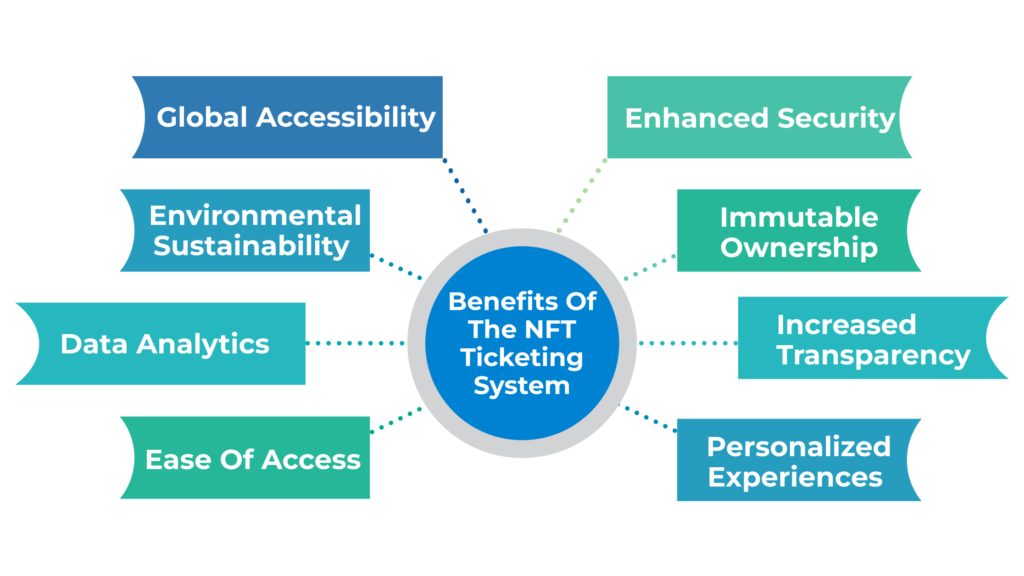
The emergence of NFTs has revolutionized the concept of ticketing systems, offering numerous benefits to event organizers and ticket holders alike. NFTs are one-of-a-kind digital assets that serve as proof of ownership or validity. In the context of ticketing, NFTs have introduced a range of advantages that enhance security, transparency, and flexibility while providing a seamless ticketing experience.
Here are some key benefits of using an NFT ticket platform:
-
Enhanced Security
NFTs utilize blockchain technology, ensuring ticket authenticity and preventing counterfeiting or fraudulent activities. The decentralized nature of blockchain provides a tamper-proof record of transactions, enhancing security for both organizers and ticket holders.
-
Immutable Ownership
NFTs establish clear ownership records, eliminating disputes and enabling secure transfer or resale of tickets on secondary markets. Ticket holders can prove their ownership and transfer NFT tickets with ease, ensuring a transparent and trustworthy process.
-
Increased Transparency
Blockchain-based NFT ticket systems provide a transparent record of transactions, enhancing accountability and preventing ticket scalping or price manipulation. Every transaction is recorded on the blockchain, making it easier to track and verify ticket sales.
-
Personalized Experiences
NFT tickets can include additional perks, such as exclusive access to VIP areas, meet-and-greet opportunities, or digital collectibles. This personalization enhances the overall event experience and creates a sense of exclusivity for ticket holders.
Read Blog: Solana Marketplace NFT: How to build your own NFT Marketplace
-
Ease of Access
NFT tickets can be stored in digital wallets, making them easily accessible through smartphones. This eliminates the need for physical tickets, reducing the risk of loss or damage and simplifying entry procedures for attendees.
-
Data Analytics
NFT ticket systems provide organizers with valuable data insights, such as attendee demographics and purchasing patterns. This data can be used to understand audience preferences, tailor marketing strategies, and improve event planning for future events.
-
Environmental Sustainability
NFT ticket systems contribute to environmental sustainability by reducing the need for physical tickets, which require paper and ink production. By adopting digital NFT tickets, organizers can significantly reduce their carbon footprint and contribute to a greener future.
-
Global Accessibility
NFT ticket systems eliminate geographical limitations, allowing people from anywhere in the world to purchase and attend events. This expands the audience reach for organizers and enables fans to access events they may not have been able to attend otherwise.
With these benefits, NFT ticket systems offer a promising future for the ticketing industry, combining security, convenience, personalization, and environmental sustainability. By leveraging blockchain technology and digital assets, NFTs are transforming the way tickets are bought, sold, and experienced, creating a more efficient and inclusive ticketing ecosystem.
NFT Ticketing Use Cases Explored
1. NFT Ticketing for Concerts, Festivals, and Live Events
NFT ticketing platform presents innovative opportunities for organizers and artists to interact with their audience. For instance, they can offer exclusive content like photos and videos from the event or invite-only passes through NFT tickets. Additionally, organizers can introduce lifetime passes similar to Kings of Leon and Coachella. NFT tickets can also be utilized for rewards-based video games and exclusive experiences, enhancing brand engagement and loyalty.
2. NFT Ticketing for Sports Events and Games
Sports events and games can leverage NFT ticketing by providing digital passes with dynamic updates upon redemption. These tickets can offer additional perks such as free food/beverage vouchers, access to exclusive merchandise, and airdrops of additional NFTs. By maintaining consistency across multiple events, NFT ticketing can foster continued engagement, leading to greater rewards such as personal meet-and-greets and upgraded seats. For example, the NBA plans to issue NFT “ticket stubs” to fans redeeming their tickets at the venue, potentially generating passive revenue through future secondary sales.
3. NFT Ticketing for Conferences, Meetups, and Other Events
NFT ticketing holds significant value for conferences, meetups, and events. An example is Consensus’ annual blockchain and crypto conference in 2019, which offered attendees an NFT swag bag containing items like CryptoKitties. Over time, the value of CryptoKitties increased, demonstrating the potential for NFT swag bags to become collectibles and appreciate in value. This highlights how NFT ticketing can enhance the experience and value proposition of events, attracting attendees and fostering engagement
What Opportunities Does NFT Ticketing Provide To Guests?
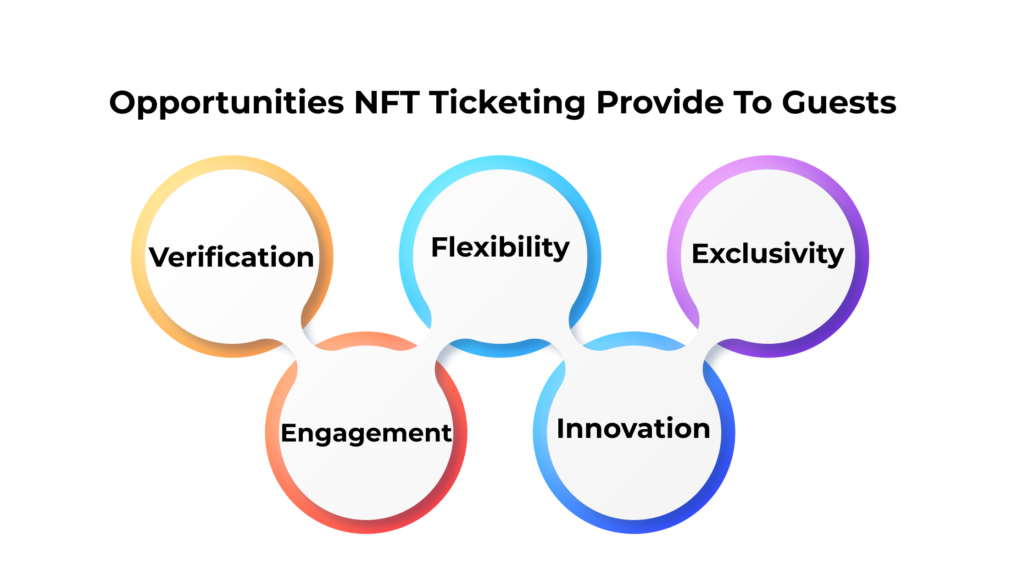
NFT ticketing offers a range of exciting opportunities to guests, transforming their event experience in several ways:
- Verification: With NFT ticketing, visitors may use the blockchain to check the validity and ownership of their tickets. This reduces the possibility of fake tickets and gives visitors more peace of mind.
- Flexibility: NFT ticketing enables patrons to safely and conveniently transfer their tickets to others as well, either by giving them to loved ones or by reselling them on the secondary market. For visitors who might need to rearrange their plans or can’t attend the event, this offers more convenience and flexibility.
- Exclusivity: By offering limited-edition, collectible tickets that are exclusive to the event, NFT ticketing may give attendees a feeling of exclusivity and interest. This can improve attendees’ overall enjoyment of the event and provide them with priceless souvenirs.
- Engagement: Because NFT ticketing enables the development of personalized and customized tickets that represent the event’s theme or logo, it may also provide visitors with an engaging and participatory experience. This can help people feel more connected to the occasion and increase how much fun they have while there.
- Innovation: NFT ticketing is a cutting-edge and creative approach to event ticketing that shows the event organizer’s dedication to being on the leading edge of technology and giving attendees an innovative experience.
Read Our Blog: The Future of NFTs: More Than a Digital Collectible
Overall, the NFT ticket platform offers visitors a safer, more flexible, exclusive, interesting, and inventive method to attend events, which can improve their entire experience and happiness.
What Opportunities Does NFT Ticketing Provide To Organizers?
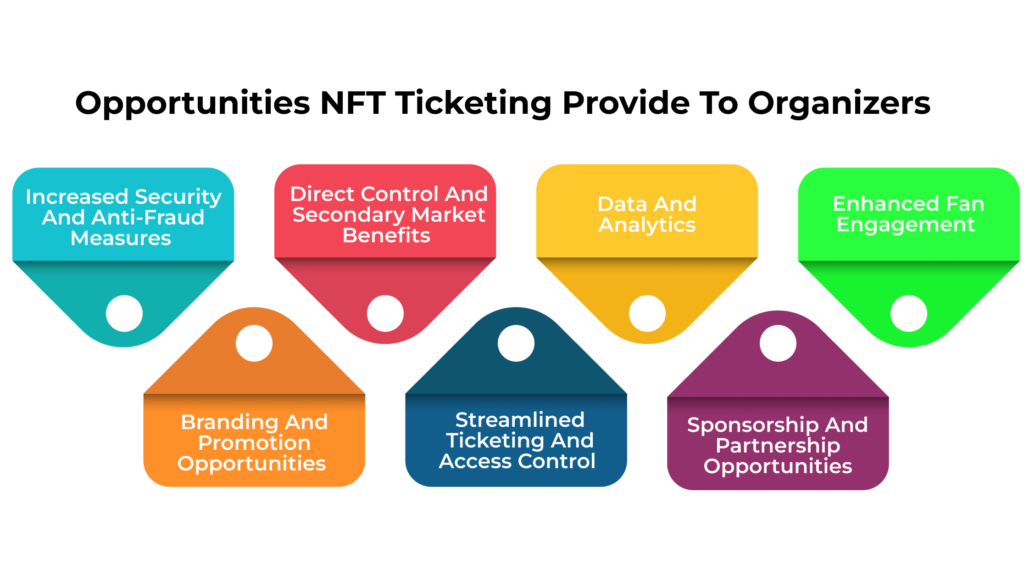
NFT ticketing provides organizers with a wide range of opportunities, empowering them to enhance event management, revenue generation, and fan engagement. Here are some key opportunities that NFT ticketing offers to organizers:
- Increased Security and Anti-Fraud Measures: NFT tickets leverage blockchain technology, ensuring a high level of security and eliminating the risk of counterfeit tickets. This protects organizers from ticket fraud and unauthorized entry, maintaining the integrity of their events.
- Direct Control and Secondary Market Benefits: NFTs enable organizers to have direct control over ticket sales, pricing, and distribution. They can set rules for reselling and earn royalties from secondary market transactions, providing an additional revenue stream. This control over the secondary market can also help prevent ticket scalping and price manipulation.
- Data and Analytics: NFT ticketing app provides organizers with valuable data and analytics regarding ticket sales, attendee demographics, and engagement patterns. This information can be used to make data-driven decisions, improve marketing strategies, and enhance future event planning.
- Enhanced Fan Engagement: NFT ticketing allows organizers to offer exclusive perks and experiences to ticket holders. By creating unique digital collectibles or granting access to special events or content, organizers can deepen the connection between fans and the event, fostering a sense of loyalty and enthusiasm.
- Branding and Promotion Opportunities: NFTs provide a novel way for organizers to showcase their brands and promote their events. Custom-designed NFT tickets can serve as collectibles or limited-edition memorabilia, creating additional excitement and buzz around the event.
- Streamlined Ticketing and Access Control: NFT ticketing platforms often integrate with event management software, streamlining the ticketing process and reducing administrative burdens. The digital nature of NFT tickets eliminates the need for physical tickets, reducing costs and logistical challenges associated with printing and distribution.
- Sponsorship and Partnership Opportunities: NFT ticketing opens up new avenues for organizers to collaborate with sponsors and partners. NFTs can be co-branded or include sponsored content, providing additional revenue streams and cross-promotion opportunities.
Overall, NFT ticketing empowers organizers to create unique experiences, improve operational efficiency, and maximize revenue potential. It brings innovation and transparency to the ticketing process, benefiting both organizers and event attendees.
Conclusion
In summary, NFT ticketing, which uses blockchain technology to provide unmatched transparency, security, and interaction, is a revolutionary step forward for the ticketing business. Being a top provider of NFT marketplace development services, SoluLab distinguishes itself by providing a full range of solutions such as tokenization, smart contract creation, NFT consultancy, and marketplace support. Event planners and companies may fully utilize NFT tickets by establishing safe, adaptable platforms for exchanging digital assets with the help of SoluLab’s experience.
Adopting NFT ticketing creates new opportunities for success and creativity in addition to improving the event experience. Partnering with SoluLab guarantees that businesses stay ahead of this changing landscape as this game-changing technology continues to change the industry. To begin your adventure into the world of NFT ticketing and discover the countless opportunities that lie ahead in this innovative and dynamic arena, get in touch with SoluLab today!
FAQs
1. What is NFT ticketing, and how does it differ from traditional ticketing?
NFT ticketing refers to the use of Non-Fungible Tokens (NFTs) to represent event tickets digitally. Unlike traditional tickets, NFTs are unique, verifiable, and cannot be duplicated or counterfeit, ensuring enhanced security and authenticity.
2. How can NFT ticketing prevent ticket fraud and scalping?
NFT ticketing leverages blockchain technology, making it nearly impossible to forge or counterfeit tickets. The transparent and decentralized nature of the blockchain ensures a secure and tamper-proof record of ticket ownership, preventing fraud. Additionally, organizers can set rules for reselling and earning royalties from secondary market transactions, curbing ticket scalping.
3. What benefits does NFT ticketing offer to event organizers?
NFT ticketing platform provides organizers with increased control over ticket sales, secondary market transactions, and pricing. It also offers valuable data and analytics on ticket sales and attendee demographics, enabling data-driven decision-making. Furthermore, NFT ticketing allows for enhanced fan engagement, branding opportunities, and streamlined ticketing processes.
4. How does NFT ticketing enhance the guest experience?
NFT tickets offer guests unique opportunities such as exclusive perks, access to limited edition merchandise, backstage passes, or meet-and-greets. It also provides a transparent record of ownership, enabling seamless transferability and reselling. Guests can engage with digital collectibles, participate in interactive experiences, and join virtual event communities, enhancing their overall event experience.
5. Can NFT ticketing be integrated with existing event management systems?
Yes, NFT ticketing can be integrated with existing event management systems. Experienced technology providers like SoluLab offer solutions that seamlessly integrate NFT ticketing platforms with the organizers’ existing infrastructure, ensuring a smooth transition and streamlined operations.




